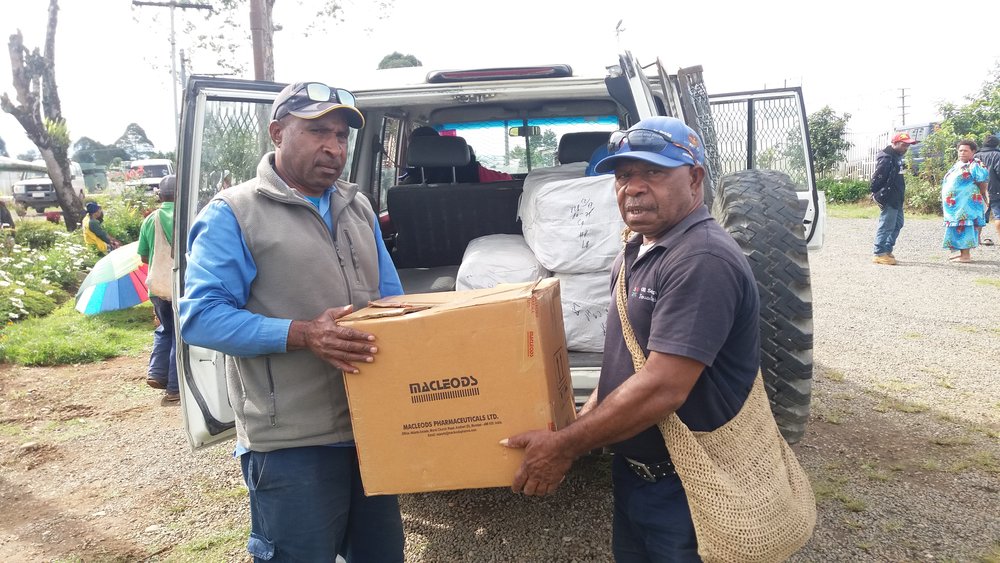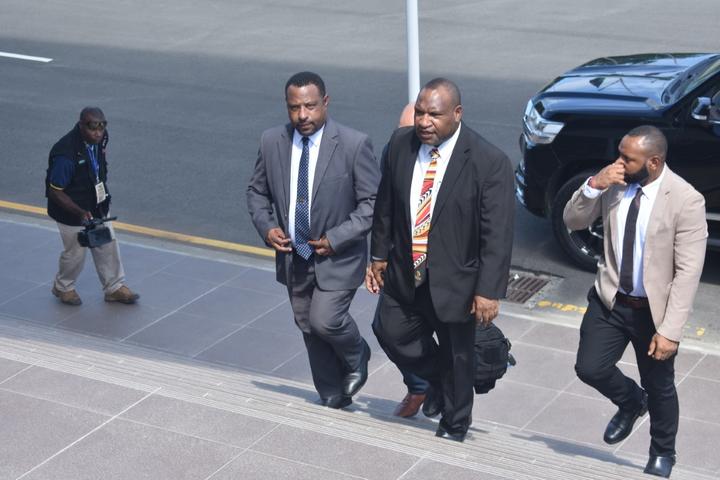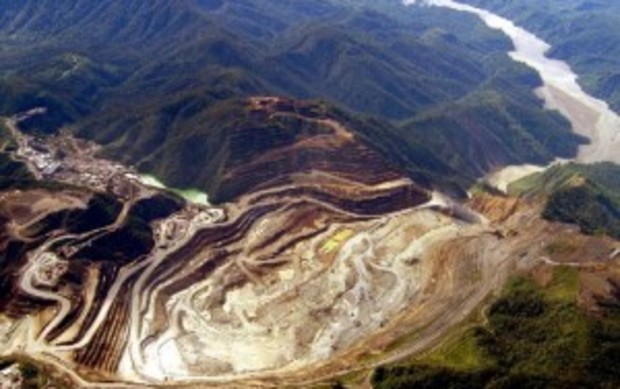
Posted by The National
Papua New Guinea (PNG)’s 8th Prime Minister James Marape spoke to The National’s senior writer MALUM NALU in an exclusive interview last week. Marape wants to transform the agriculture sector into a vibrant revenue earner for PNG.
IT is not difficult to fathom why Prime Minister James Marape has made it loud and clear that he wants PNG’s agriculture to be transformed into an international standard industry and revenue earner for the nation.
Some 85% of 8.4 million Papua New Guineans are still dependent on agriculture for subsistence today. Thus, developing downstream food processing and manufacturing activities will naturally raise the demand for the farmers’ organic fresh produce.
The increased demand will then put more money into the pockets of the 8.4 million people nationwide.
To stress his focus to deliver to the people, Marape is making the unprecedented move to appoint three vice-ministers to help Agriculture and Livestock Minister John Simon to implement policies and projects aimed at boosting the industry’s production and activities.
Marape said the Government’s other key economic focuses for PNG’s socio-economic growth would be tourism, forestry and fisheries but “my view is that agriculture is the biggest driver with majority and direct participation of the people”.
He said the action plan was about changing, adopting and implementing modern effective and realistic commercialisation measures to raise the level of “our agriculture sector and industry”.
“In short, it is about building and developing a supply chain system to optimise the returns from our fresh agriculture produce that Papua New Guineans worked on their land,” he added.
Marape said: “My No.1 task as PM is to obtain the European Union grant to develop the cocoa industry in Momase. Industrialisation will take place but we need to have an economic case to provide the impetus for progress.
“We’ve been an agricultural nation long before the arrival of Kutubus, Ok Tedis, Porgeras and Lihirs.
“While coffee, cocoa, copra and oil palm were the mainstay of agriculture, organic food and livestock had huge growth potential, especially to the lucrative Asian market.
“These are agriculture produce and products that can put PNG in the international market or world map. Expanding agriculture empowers our people. We also help strengthen our global forex standing by importing less beef and rice.
“Food imports alone costs us K2 billion in capital flight. Agriculture is, therefore, really where the future lies for us all.”
In another exclusive interview with The National last month, Marape said he would support the US$600 million (K2.03 billion) PNG-China Integrated Agriculture Park Project if it “followed proper economic rationale” and there is “a return on our investments”.
The parks, to be located at Korofeigu in Eastern Highlands and Highlands’ Agriculture Training Institute (HATI) in Western Highlands, will be funded under China’s Belt Road Initiative (BRI).
“I have issues when there are no direct returns on investments to our country. It then becomes a project that is for the convenience of sponsors of the project.
“The projects at Korofeigu and HATI are noble projects with great intentions. Everyone in Cabinet and in Government know the intentions of this project.
“I will support the project as long as it pays dividends to our people. The project is a goer, so long as I can see, visibly, our people earning money in five to 10 years’ time and it’s not just another ‘ghost project’,” he added. Marape agreed that the value chain remained the biggest hindrance to development of agriculture, which he said had regressed in the country since 1975, despite agriculture being a natural for PNG.
“A couple of years ago, while in Australia, I witnessed the opening of Toowomba International Airport, which specialised in export of organic agriculture produce to the Asian market.
“The inaugural flight was from Toowoomba to Hong Kong: an eight-hour flight to deliver 87 tonnes of vegetables like cabbages, broccoli, tomatoes, lettuce, capsicum, cauliflower.
“The flight is more expensive than out of Komo, Mt Hagen or Nadzab.
“My thought went to Komo – the biggest runway in PNG sitting there like a White Elephant.
“I am thinking big in the field of agriculture, not only in terms of the domestic market but the international market.
“Look at cities like Singapore, Hong Kong, Shanghai, Beijing, Jakarta, Tokyo which have millions of affluent citizens who are looking for food.
“We should pick up so that 10 years from now, we are a successful supplier of good, reliable food, not just coffee, copra or cocoa.
“Organic food is the way to go.”
Forestry
Getting Papua New Guineans more involved in forestry is the other industry to focus on for the benefit of the peope.
“After agriculture, forestry is the next priority,” he said.
“People are already there. They own the land. Engage them in forestry business and related downstream activities, especially putting logs on a ship and exporting them overseas.
This is where the Government is stepping in,” he added.
Tourism and Law-and-Order
Marape lamented that law-and-order issues and public security woes “are the major hindrance to tourism development. This is why it is important to start addressing law-and-order issues robustly in tandem with our focus on developing agriculture and tourism. I don’t see massive erosion in our cultural heritage over the next 10 to 15 years (to attract tourists),” he said. “We will still maintain it. That window gives us an opportunity to build up our agriculture. When people see that there is money in coffee, cocoa, growing cabbages and broccoli, produce is going to market, that there is law-and-order, in five years we can turn around. Our country can then become safer and, naturally, tourism will also benefit.
“That (tourism) is something that is really big out there. But you can’t talk about tourism development and growth when we have law-and-order issues and public security woes. Let’s work on it, but let’s transfer money to our people in other priority areas first. Of course, we will help to grow established tourism destinations, such as Madang. It is something that we will constantly monitor and work on,” he added.
Sovereign Wealth Fund (SWF)
Marape said the setting up of the long-overdue SWF “is one of the priorities of the new Government. “The failure to set up the PNG SWF was a matter of concern for my Government. The money for the SWF should be coming from state-owned enterprises (SOEs) such as Kumul Petroleum Holdings Ltd (KPHL) and Kumul Minerals Holdings Ltd (KMHL). Marape said KPHL and KMHL should be holding shares for the Government in various projects and paying dividends to the SWF.
“The SWF will be expanded and developed. I believe in saving for the future, especially from our non-renewable resource sector.
“We will also look into a dividend policy for small-medium enterprises to contribute to the SWF (for the people and country),” he added.
Health
Marape said specialist healthcare must be further developed aggressively for Papua New Guineans and PNG.
“I am emphasising on the quality aspect (of health). I want not just basic healthcare but specialist healthcare for cancers, kidney diseases or heart ailments. We need to have specialist treatment available to our people now. Many of our citizens are flying to Manila and Singapore for specialist treatment.
“We need to move into specialist care, which means that basic healthcare must be reliable. We will start with the manner in which we procure drugs,” he added.
Marape said he had full faith in his Health Minister, Elias Kapavore, under whose care Vanimo General Hospital was rated as the best in the country when he was chief executive officer. “He (Kapavore) knows exactly what to do to transform hospitals,” he added.
4G and Digital Economy
Marape says Energy Minister Rainbo Paita has been tasked with bringing down the cost of power and telecommunications. “I am awaiting a full report from Paita on the Coral Sea Cable (CSC) before making a full update on PNG’s Information Communications Technology (ICT) development.
 Huawei PNG enterprise business director Gao Song briefing delivered projects to the media.
Huawei PNG enterprise business director Gao Song briefing delivered projects to the media.
But CSC’s submarine fibre optic cable is expected to be operational by the end of this year to roll out 40 Tbps (Terabits per second) data volume. This will lift the digital connectivity for PNG and Solomon Islands to a historic level of technology,” he added.
Marape said: “It is expected to deliver faster, cheaper and more-reliable communications infrastructure as well as bring about significant economic and development activities. I have yet to be fully briefed on the construction and status of the 4G platform by DataCo-Huawei. But Paita will be presiding over Telikom and PNG Power.” DataCo and Huawei are jointly constructing and developing PNG’s 4G platform for domestic coverage targeted for completion by the end of this year or early next year. The latest media report last year was that Huawei had already completed 60% of the work to build a 5,457km network of submarine cables linking 14 coastal towns.
 (CEO) Jacky Xu
(CEO) Jacky Xu
Xu … communications is like food and water to a digital economy
Huawei Technologies (PNG) Pvt Ltd chief operating officer (CEO) Jacky Xu told the media: “I believe that internet access will be more affordable (in PNG). It is only a matter of time (upon the completion of the digital telecommunitions platform). Communication is like food and water. You need a truly reliable digital platform to survive in today digital economy and era. It is said that for every dollar in (digital) investment, the return is three times in business.” Xu spoke to journalists in Huawei PNG’s maiden media tour of the giant telecommunications corporate office cum ICT training centre in Port Moresby on June 7. He declined to reveal the cost of setting up the office but the multi-million-kina facility was completed and occupied last November. Asked whether Huawei had any plan or ambition to venture into an internet service provider (ISP) in PNG, Xu said: “No. We are only good (and specialises) in (providing) telecommunications solutions. ICT education is just the beginning or at the primary level in PNG. But PNG will catch up (with the rest of the world in digital economy). PNG’s advantage is that it is beginning from an already advanced global telecommunications technology,” he added.
 Nancy Zhang Jinnan
Nancy Zhang Jinnan
Zhang … Huawei smart phone devices not affected by US ban
Huawei PNG senior public relations manager Nancy Zhang Jinnan said her company’s operation and engagement with Papua New Guineans started last year with the launch of its annual US$30,000 (K100,000+) scholarships. “Not only have we also inked and committed to the setting up of the Huawei ICT Academy in Unitech Lae, we have also started playing our role in corporate social responsibility by organising various activities with Papua New Guineans.
“This corporate facility is testimony of our commitment to help forward PNG’s interest in ICT development. The inbuilt training centre here is to train young and bright Papua New Guineans to provide the competent and skilful human capital that’s needed to help drive the country’s digital economic growth,” she added. On the impact and concerns of Huawei smart phone users on their access to all their current Apps following the US-China trade war and the blacklist on US software providers to do business with Huawei, Zhang said: “There should be no concern in terms of use and technology. There is no change in the use of current Huawei smart phone devices. But for future devices, Huawei founder and CEO Ren Zhengfei has already announced that OS (Operating System) Hongmeng will be available for download from September. According to recent media reports, OS Hongmeng is touted to be at least 60 times faster than android and that it will be able to run android and iOS Apps.
 Jack Ma
Jack Ma
Ma … internet connectivity is now more important than electricity was last century
Connectivity to the Internet could be more important in this era, compared with access to electricity in the past century, to build an inclusive digital economy and society, according to Jack Ma, co-founder and executive chairman of Alibaba Group Holding.
“Today, if we are not connecting any country [or] if you don’t let your people connect to the internet, it’s worse than last century not letting them connect to electricity,” Ma said in a recent South China Morning Post report. [internet connectivity is] going to change a lot of things, [so] we should not leave people in the last century,” Ma said. “The digital period from now is just the beginning.”
The release of “The Age of Digital Interdependence”, a report of the UN Secretary-General’s High-Level Panel on Digital Cooperation, calls for reinvigorating multilateral cooperation among governments so that digital technologies can be used to help improve life for everyone.
“That would be complemented by cooperation with a diverse spectrum of other stakeholders, such as civil society, technologists, academics and the private sector,” the report adds.
“The release of the report, however, has come amid a raging trade and tech war between the US and China, which has disrupted international commerce and cooperation in hi-tech research. While the speed and scale of change brought by digital technologies is increasing, many people are still left out, according to the report.
It said more than half the world’s population “still either lacks affordable access to the internet or is using only a fraction of its potential despite being connected”.
The report found the proportion of people online in the developing world expanded rapidly in the past decade – from 14.5% in 2008 to 45.3% in 2018 – but progress has recently slowed.
Globalisation at the current stage is “not inclusive enough”, said Ma, adding that it does not help small businesses. “Creating jobs, security [and] privacy” are not only the concern of governments, said Ma.
“The private sector should worry about [those], too. Only if you think about jobs, inclusiveness, security and privacy will your company be sustainable and welcome in this century,” he said.
“Otherwise, you’d be out.”
Go to this link for more:
https://www.thenational.com.pg/pm-agriculture-digital-economy-%e2%80%89the-way-forward-for-png/


















